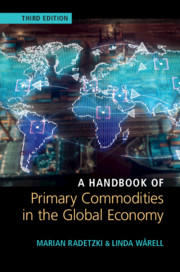Book contents
- A Handbook of Primary Commodities in the Global Economy
- A Handbook of Primary Commodities in the Global Economy
- Copyright page
- Contents
- Figures
- Tables
- Acknowledgments
- Introduction
- 1 The Historical Framework
- 2 The Geography of Commodity Production and Trade
- 3 Comparative Advantage and Trade Policy Distortions
- 4 Fossil Fuels
- 5 Price Formation and Price Trends in Commodities
- 6 Commodity Booms
- 7 Commodity Exchanges, Commodity Investments and Speculation
- 8 Sustainability and the Threats of Resource Depletion
- 9 Fears of and Measures to Assure Supply Security
- 10 Producer Cartels in International Commodity Markets
- 11 Public Ownership of Commodity Production
- 12 The Monoeconomies: Issues Raised by Heavy Dependence on Commodity Production and Exports
- References
- Index
4 - Fossil Fuels
Published online by Cambridge University Press: 06 November 2020
- A Handbook of Primary Commodities in the Global Economy
- A Handbook of Primary Commodities in the Global Economy
- Copyright page
- Contents
- Figures
- Tables
- Acknowledgments
- Introduction
- 1 The Historical Framework
- 2 The Geography of Commodity Production and Trade
- 3 Comparative Advantage and Trade Policy Distortions
- 4 Fossil Fuels
- 5 Price Formation and Price Trends in Commodities
- 6 Commodity Booms
- 7 Commodity Exchanges, Commodity Investments and Speculation
- 8 Sustainability and the Threats of Resource Depletion
- 9 Fears of and Measures to Assure Supply Security
- 10 Producer Cartels in International Commodity Markets
- 11 Public Ownership of Commodity Production
- 12 The Monoeconomies: Issues Raised by Heavy Dependence on Commodity Production and Exports
- References
- Index
Summary
This chapter is devoted to one of the commodity groups, energy, and there are at least four reasons for affording a special prominence to this commodity group. The first is the heavy dominance of energy raw materials in the commodities universe. This is true both for trade and for the contribution they make to GDP. The second reason is that supply scarcities led to an extraordinary price increase for oil in the past 40 years, and its causes warrant an explanation. The third reason is that fundamental changes are occurring in oil and gas production technologies that promise to replace historical scarcity of supply and high prices with abundance. The fourth reason is the general perception that the energy system is going through a transition toward low carbon sources, due to technical advances in non-fossil energy alternatives as well as policy efforts to hinder climate change. The four reasons that make energy special also provide the structure of the chapter.
- Type
- Chapter
- Information
- A Handbook of Primary Commodities in the Global Economy , pp. 72 - 90Publisher: Cambridge University PressPrint publication year: 2020

